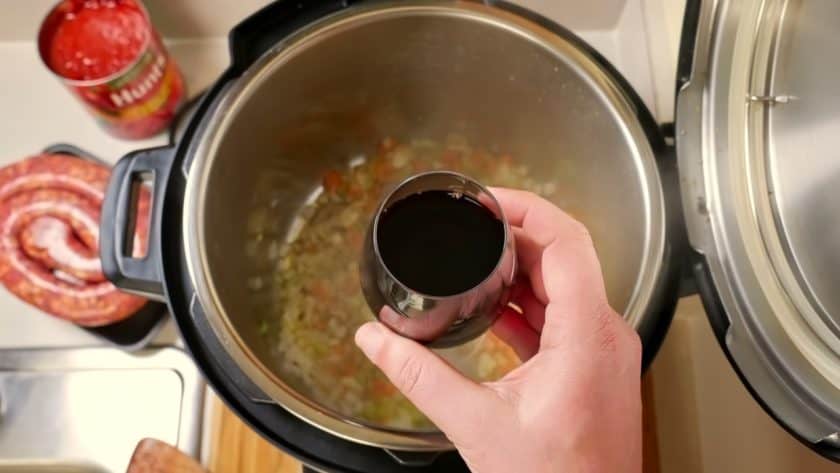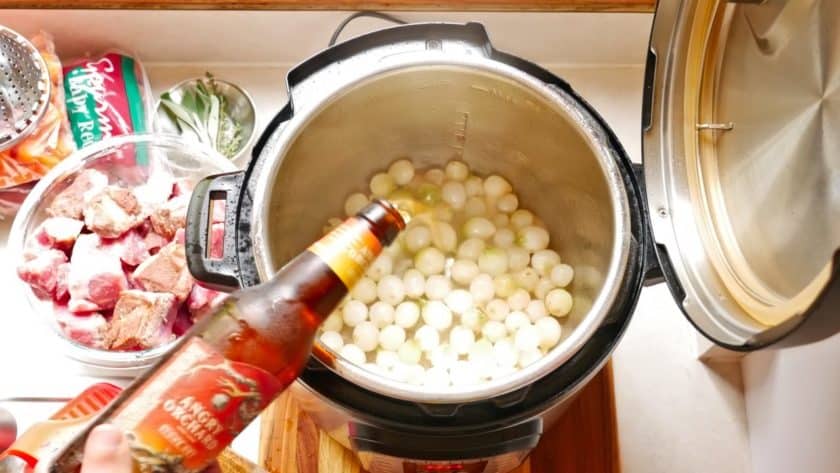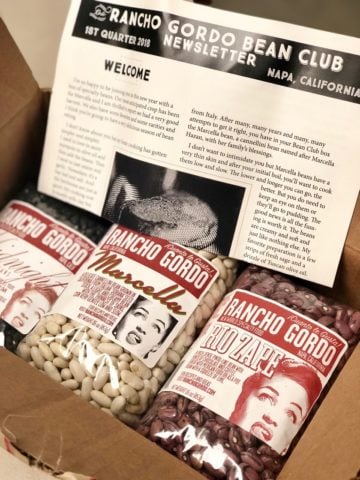
A question about my Pressure Cooker Beef Short Ribs recipe:
Could I just leave the wine out if I don’t want to use alcohol or should I replace it with another liquid? If so, what is best?
Some people can’t (or won’t) use alcohol in their cooking. I’m not one of them, but I understand where they’re coming from. I don’t want to get my guests blitzed by making beef stew, you know?
I do use alcohol in my recipes, usually wine or beer. Sometimes hard cider, particularly with pork. I’m going to refer to “wine” from now on, because it is my go-to cooking alcohol, but everything I that follows applies to beer and cider as well. Also, this is pressure cooking specific - that’s what the original question was about - but the basic ideas apply to all types of cooking.
Can I boil off all the alcohol?
For my pressure cooker recipes, I always boil the wine for a minute before locking the lid, to simmer off some of the alcohol. Alcohol boils at 172°F, so it starts evaporating sooner than the water reaches a boil.
Here’s an excerpt of the chart in the USDA table of Nutrient Retention Factors, Release 6. If you stir alcohol into a dish, and then simmer (or bake it), the amount of alcohol remaining is:
| Baked/Simmered for | Alcohol remaining |
|---|---|
| 15 min | 40% |
| 30 min | 35% |
| 1 hr | 25% |
| 1.5 hr | 20% |
| 2 hr | 10% |
| 2.5 hr | 5% |
In other words, if you’re trying to absolutely avoid alcohol, skip it entirely - you can’t simmer it away.
Does this concern me? No. My recipes don’t boil the wine to remove *all* the alcohol. I want the flavors of the wine in the dish - more on that later - but I also want to boil off some of the alcohol, or the dish tastes a little “hot”. A minute or two is enough for me. And, in pressure cooking, I have to do it before I lock the lid. A pressure cooker is a sealed environment - nothing is evaporating, it’s all trapped in the pot to build pressure.

The other reason adding wine doesn’t concern me? I don’t have that much wine in my recipe to start with. I usually add ½ cup to 1 cup of wine to my recipes. (Especially when I’m pressure cooking. That sealed environment again - I don’t want to overload the dish with alcohol when it can’t simmer off.) Combine the bit of alcohol I boil off with the other liquids I add to the pot, and the juices released by the food as they cook - by the time we’re done, each individual serving has a very small amount of alcohol left in it, and you’d have to eat an entire pot of stew yourself to get the equivalent of a glass of wine.
I enjoy cooking with wine. Sometimes I even put it in the food
- Julia Child
Why use alcohol in cooking?
After all that…why do I bother? Flavor. Wine adds complex flavors that you can’t get from water; it is made from fermented grapes, after all, and there’s a lot going on in there. Also, my understanding of the science is some flavors are alcohol soluble - the alcohol can unlock flavors you wouldn’t get to taste otherwise.
What can I substitute for alcohol in a recipe?
Still not convinced to use alcohol in the recipe? That’s OK, I won’t hold it against you. (I just got rolling on the science, and couldn’t help myself.)
To answer the original question: substitute broth or water, preferably chicken broth, for the wine. (If you have a pressure cooker, because you should always have some homemade chicken broth in the freezer.) If the recipe has water as the main liquid, then I’ll add more. But I prefer broth. Broth, like wine, adds extra flavors to the recipe - but it’s a different set of flavors. Broth has body and sweetness, wine has acid and sweetness. The recipe will come out differently, but it will still be good.
Another trick is a splash of vinegar. Balsamic vinegar, red wine vinegar, white wine vinegar, sherry vinegar…there are many options. Vinegar is made from wine, so it adds the acid I’m looking for. (Vinegar does have trace amounts of alcohol in it, but they’re miniscule. That said, if you are really, truly opposed to any alcohol whatsoever, you may have to skip the vinegar). Some recipes recommend adding 1 cup of stock and a teaspoon of vinegar as a wine substitute. I usually stir a splash of vinegar in at the end, in the “season to taste” step. Most soups and stews need a little hint of acid - that’s why I use wine so often - and a splash of vinegar helps bring up the taste of the dish. Don’t use too much vinegar. “Hey, this smells like vinegar” is not what you want to hear. Add a little, stir, taste, and when the flavor perks up, stop.
Speaking of secret ingredients - did you know Tabasco is a vinegar based hot sauce, adding a little heat to go with the acid? Add a shake or two, stir it in, and I’ll bet no one notices, other than to say “hey, this tastes great!”
What do you think?
Questions? Other ideas? Leave them in the comments section below.
Related Posts
Pressure Cooker Beef Stew with Mushrooms
Pressure Cooker Browned Chicken Broth
My other Pressure Cooker Recipes
My other Pressure Cooker Time Lapse Videos
Enjoyed this post? Want to help out DadCooksDinner? Subscribe to DadCooksDinner via eMail and share this post with your friends. Want to contribute directly? Donate to my Tip Jar, or buy something from Amazon.com through the links on this site. Thank you.





Kate says
I make your short rib recipe and sub in broth with a splash of vinegar instead of the wine. It still tastes great. That is also my standard sub for other recipes as well. I usually use red wine or cider vinegar.
Aaron Friedman says
I switched to dry vermouth instead of wine (I prefer cooking with white) recently. It keeps better in the fridge and is vital to a Martini.
Mike Vrobel says
That was Julia child’s trick too, so you’re in good company!